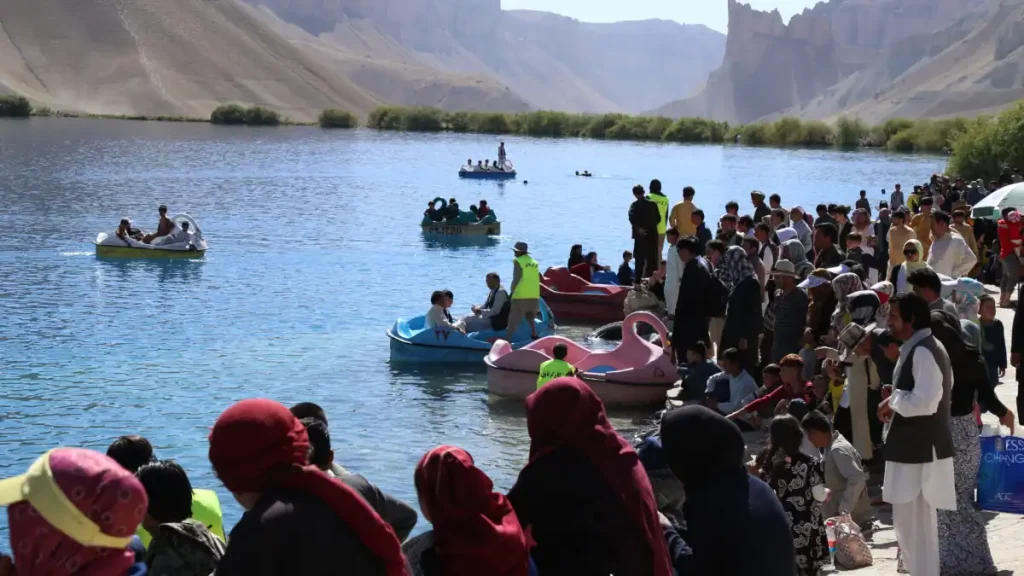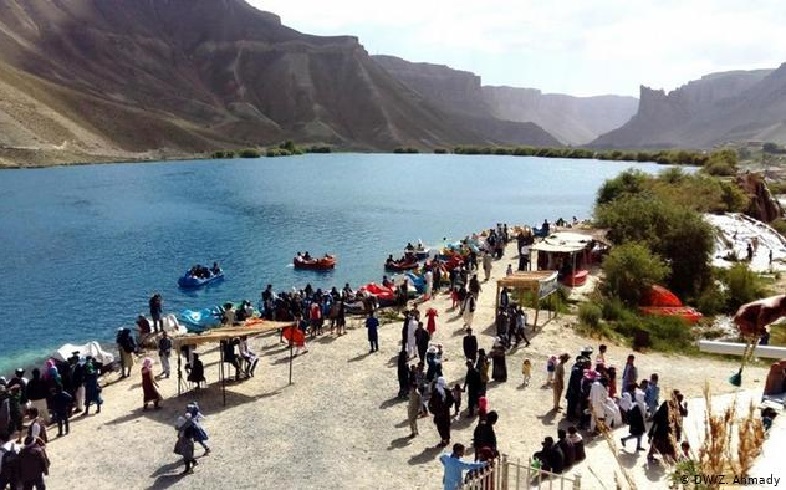The ban on women in Band-e Amir National Park in Bamyan by the “Ministry for the Promotion of Virtue and the Prevention of Vice” of the caretaker government has been met with widespread reactions and criticism at the national and international levels. Protests against this new restriction on women, especially among women inside Afghanistan, seem more prominent.
Last week, Acting Minister Mohammad Khaled Hanafi announced in a visit to Bamyan that the women could not travel to Band-e Amir because of what he called “non-compliance with the rulings issued regarding the wearing of the Hijab in the past two years.” He stressed that the ban would continue until “concrete principles” were established.
Following the remarks, a large number of citizens, international human rights bodies and UN officials called it “unwarranted.” Richard Bennett, the UN Special Rapporteur on Human Rights in Afghanistan, asked the acting government for an explanation and asked in a tweet “why this restriction is necessary for Afghan culture and Sharia.”
People keeping distance from the government
In the wake of the backlash, the women of Bamyan said they were “shocked” to hear of the “new ruling.” They see the consequences of issuing such “decrees” as intensifying despair among women and increasing social problems.
“Such stances against women, by questioning justice and equality as guarantees for stability of the government, cause loss of trust between the state and the nation,” Niloufar Elaahi, one of the Bamyan women, told Sattagydia.
Instead of thinking about the country’s security and progress, the current ruling body is focused on “limiting the space for women and violating their human rights,” which she believes provides “bacward” grounds, she added.
In addition, Anisa Soltani, a girl who carries “the sigh burden of not going to school,” says she worries about the day that she believes “even women may be banned from breathing.”
Worsening mental health problems among women
Bamyan women and girls say they had hoped so far, at least because they could reduce the “suffering caused by school and university blockades and denial of the right to work” by traveling to recreational places, but even that possibility has now been taken away. According to these women, if the ban on women attending recreational places continues, they will be subjected to additional psychological pressure by becoming too isolated.
Masuda, a 19-year-old girl who is concerned about the area, believes this will increase family problems and cause unfortunate events within families.
He also said that the blocking of Bandamir’s gate to women would undermine the economy of Bamyan. According to this young lady, most people went to the national park with their families. Because of the loss of travel to this tourist destination, the number of tourists entering Bamyan has greatly decreased and affected the economy.

“Escape from the Cage”
Halima, another young girl, says she “feels more caged” than ever before when she hears “the decree of the Ministry for the Promotion of Virtue and the Prevention of Vice.” There are other girls who experience the same feeling.
Rahima, a daughter from Daikundi, said that in the past two years, all the aspirations of Afghan women have been violated: “We were denied lessons, we were denied entry to parks in the city and they brutally killed our spirits. Our only hope was to travel to Band-e Amir, but it is banned for us as well.”
She added that whenever he missed, he traveled to Band-e Amir, but now she is “sorry” that she is not allowed to even watch the blue waters of the Lake.
New restrictions on women have brought in large numbers of women to migrate and leave the country. They say that the areas of life for them in Afghanistan are becoming more limited with each passing day.
Mahnaz Vakilzadeh, an 18-year-old girl who has recently been able to leave the country and has been living in New Zealand for a month, cites the lack of work and education for women in the country as the reason for her migration. Now that women have been denied the “right to have fun,” she said, women and girls cannot be motivated to live in Afghanistan.
Another girl who visited Pakistan last month, Sahar Wafa (pseudonym) accuses the caretaker government of trying to “completely remove women from everywhere.” In a phone call with Sattagydia, she stated that she had become “pessimistic” about her “being a woman” when she heard the news of the ban on women in Band-e Amir, and felt miserable because she was “born in Afghanistan.”
Local government reaction
Just one day after the announcement of the ban on women in Band-e Amir’s National Park, Bamyan’s “Promotion of Virtue and the Prevention of Vice Department” established a checkpoint on the way to the Band-e Amir. This caused the number of tourists to Bamyan to experience an unprecedented decline.
In response, social media users, especially the citizens of Bamyan, in response to this restriction during the tourism season, asked the local administration of this province to take action to address this problem by considering the effectiveness of tourists’ presence in economic growth of citizens.
“The decree was issued by Ministry for the Promotion of Virtue and the Prevention of Vice and the investigation of its aspects is carried out by the same department,” said Abdul Saboor Farzan Saighani, the spokesman for the Bamyan governor to Sattagydia. Stating that the Bamyan local government is “trying to maintain and observe the Islamic veil,” he emphasized that the department is trying to talk to the “leadership of the Islamic Emirate” and seek a solution to the problem.
After the fall of the previous Afghan regime and the formation of the caretaker government, women faced many restrictions in various fields. For the past two years, they have been gradually denied the right to education, work and presence in entertainment venues. Although the authorities of the Acting Government have repeatedly spoken of efforts to “provide conditions and define religious rules” for the return of women to society, there has not yet been any tangible action in this regard, and women are facing new restrictions every day.











Read More
Afghanistan National Futsal Team Starts Strong with a Decisive Victory over Tajikistan
Afghanistan National Futsal Team Faces a Tough Challenge in the “Group of Death” at the Islamic Solidarity Games
The Lions of Khorasan Crowned Champions After a Historic Humiliation of Iran